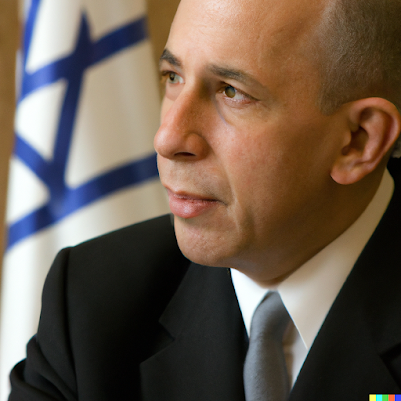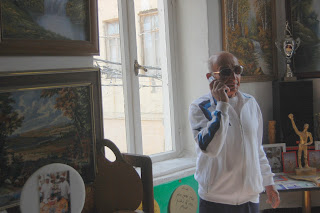My Unfinished Apartheid Thriller
An Israeli Prime Minister as imagined by the DALL-E AI programme
About six months ago, I was revisited by the writing bug and decided to try my hand at fiction - a "diplomatic thriller" to be more specific. The choice of genre was not dictated by any literary preferences. I'm not a big fan of thrillers. But the idea was to use the thriller as the most suitable vehicle to write about what was really bugging me - Israel's inevitable slide into apartheid.
I also thought that my professional experience might come in handy. For more than two decades I worked as the press officer for the EU Delegation to Israel and followed the sometimes turbulent relations between Israel and the European Union from the vantage point of an Israeli working inside the EU, in other words as someone with a split identity. I believed that this familiarity with the mind-sets and decision making processes of both sides would somehow provide me with the tools to weave a believable tale. The pace would be fast, skipping between Tel Aviv and East Jerusalem, the West Bank and Brussels. It was to be a diplomatic comedy of errors, poking fun at the hypocrisy, arrogance and ignorance of the Europeans, the hypocrisy and growing nationalistic, messianic extremism of the Israelis and the hypocrisy and adamant rejectionism of the Palestinians. But while the tone was supposed to be relatively light hearted, the underlying message was serious. Unless Israel changes course rapidly it is on a slippery slope to becoming internationally recognised as an apartheid state.
I sketched out a rough plotline. The year is circa 2028. Bibi has signed a plea bargain and has been replaced by a more hawkish prime minister (Matityahu Eshel) yet he too is a captive of his ultra-nationalist and ultra-orthodox coalition partners. Israel is cracking down on Palestinian efforts to regain a modicum of control of Area C, considered in Israel to be "ours", but has yet to formally annex it. In the EU Delegation to Israel in Tel Aviv, an Anglo-Israeli press officer (Michael Kaye) torn between clashing identities, has to navigate his way through a crisis in EU-Israel relations while trying to explain the EU position to a hostile Israeli media. The crisis is triggered by a tragic clash on a misty night in a fictional West Bank village. Local Palestinians are trying to replant their olive grove and regain it from the 'hilltop youth' hooligans of a nearby illegal settlement. The planting operation is funded by the EU as part of a new push to safeguard Palestinian land rights in Area C and a Belgian EU humanitarian aid worker has joined as an observer. Meanwhile, a Palestinian militant has been tipped off and is watching through the telescopic night-sights of his sniper rifle. The Palestinian tree planters are attacked by scores of club-wielding hilltop youth while a squad of soldiers looks on without intervening. The Palestinian militant fires at the soldiers, badly injuring one. The other soldiers, believing that the fire came from the olive tree planters, return fire, killing the EU humanitarian aid worker.
Public opinion on both sides is shocked and appalled. The Israeli media focusses on the EU's blatant intervention in Area C, contrary to the Oslo Accords. European public opinion focusses on Israel's "war crimes" and demands an independent investigation. Israel refuses. The EU responds by demanding that all settlers request a visa to enter the EU's Schengen Area. A furious PM Eshel cries antisemitism and instigates wide ranging anti-terror operations. This, in quick succession, sparks a Third Intifada, the dissolution of the weak and corrupt Palestinian Authority and a decision in the midst of the havoc by Eshel and his allies to annex Area C. Israel is now directly responsible for three million Palestinians in the West Bank but is willing to grant citizenship only to those who voluntarily swear allegiance to Israel "as the nation state of the Jewish people". A new Palestinian protest movement arises, demanding equal rights for all Israeli subjects between the Jordan and the sea. The UN General Assembly passes a resolution declaring Israel an apartheid state. Israel's liberal, secular elite flees the country. Refugees Michael Kaye and his EU-Palestinian opposite number (on a Hamas hit list) meet up in Brussels and decide to open a joint consulting business (or possibly a Middle Eastern restaurant).
Problems with this fictional scenario first appeared in flashing lights on November 1st, 2022 when Netanyahu won the elections with the help of two ultra-orthodox and three ultra-nationalist, racist, messianic and homophobic parties that he had forged into one list. From then on the plausibility of my plotline started to rapidly unravel. It soon turned out that the combined interests of the coalition partners - of Bibi (the accused) to stay out of jail, of Shas leader Arye Deri (the convicted) to be appointed to two ministerial posts, of the haredi parties (the indispensable) to avoid teaching core subjects and performing army service, and of (wacko pyromaniacs) Ben Gvir and Smotrich to gain control of West Bank settlement and the Israel Police - demanded a radical "judicial overhaul". This would largely emasculate and politicise the judiciary and leave all real power in the hands of the ruling coalition. Or as the Opposition put it, create, "a theocratic dictatorship". Liberal, secular Israelis take to the streets en masse week after week to defend democracy. Hundreds of economists as well as The Economist warn of a collapse as high-tech companies move their money abroad. Crack volunteer army and air force units who could be indicted by the International Criminal Court in the absence of an independent judiciary, threaten not to fight for a dictatorship. A government minister tells them to "go to hell". The US sends one envoy after another to warn Netanyahu to slow down. Netanyahu takes off with Sarah for Paris, Berlin and Rome. Sarah reserves 60 hotel rooms at the public's expense so as to stay at her favourite hotel against the advice of the Shin Bet. Decades of pent up frustrations on both sides of the argument rise to the surface in an orgy of verbal and increasingly physical violence. All compromise attempts fall flat. President Herzog says, "The last few weeks have been tearing us apart. Israel is in the throes of a profound crisis. Anyone who thinks that a real civil war, of human life, is a line that we will not reach has no idea. The abyss is within touching distance."
At first I tried to desperately rewrite the chapters I had already drafted to make them fit the new political situation. Yet the pace of events was so fast and furious that I soon gave up, stunned, bruised and battered like everyone else. No match for reality, my fictional scenario, irrelevant and obsolete, supposed to take place only in five years' time, lay in whatever is the equivalent of tatters in a computer.
I should have known better.
Whatever happens next, Israel will never be the same again.




Comments